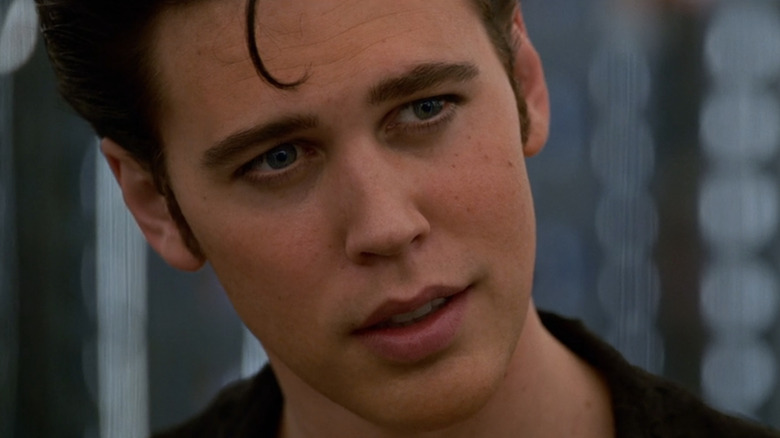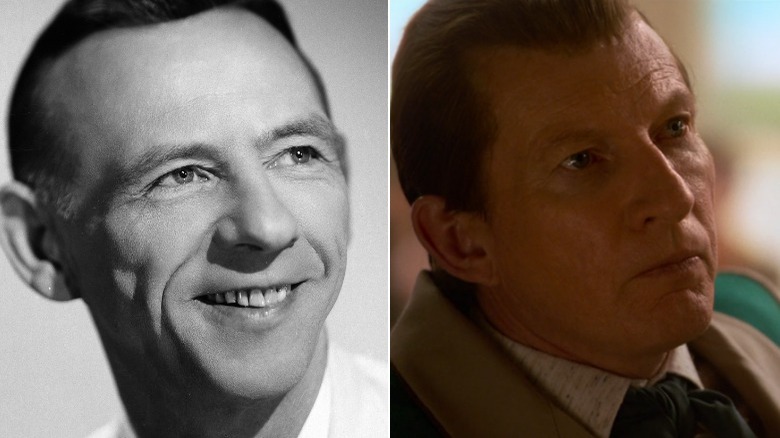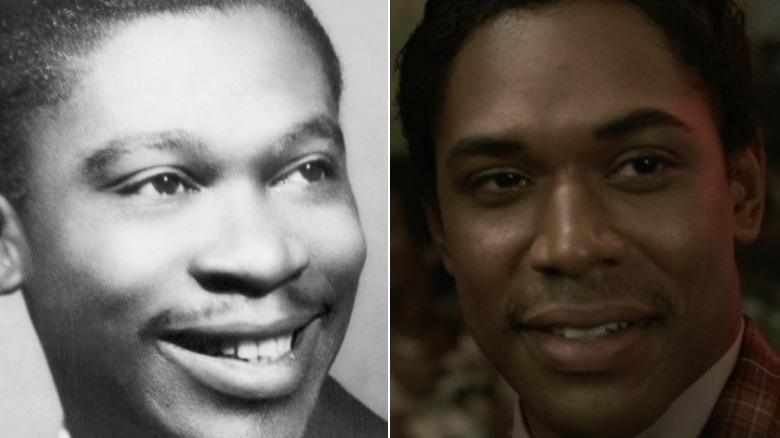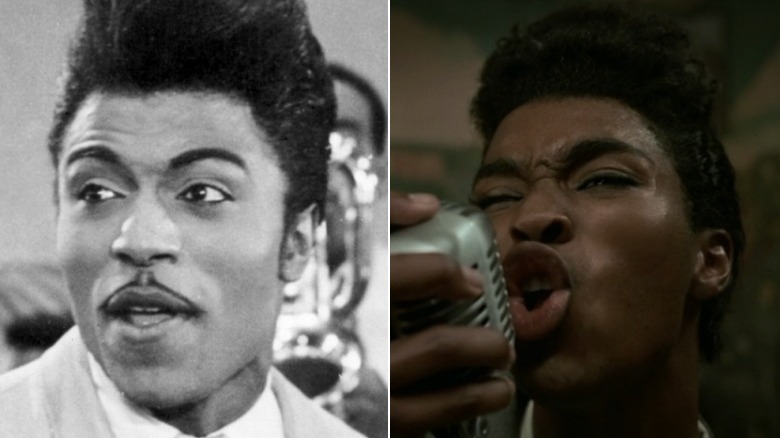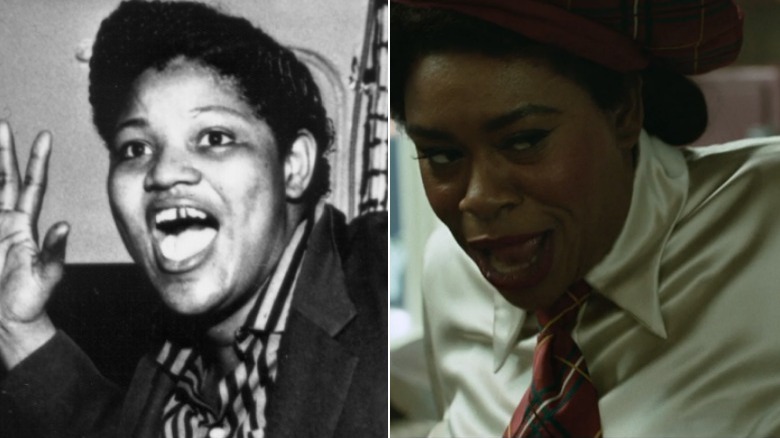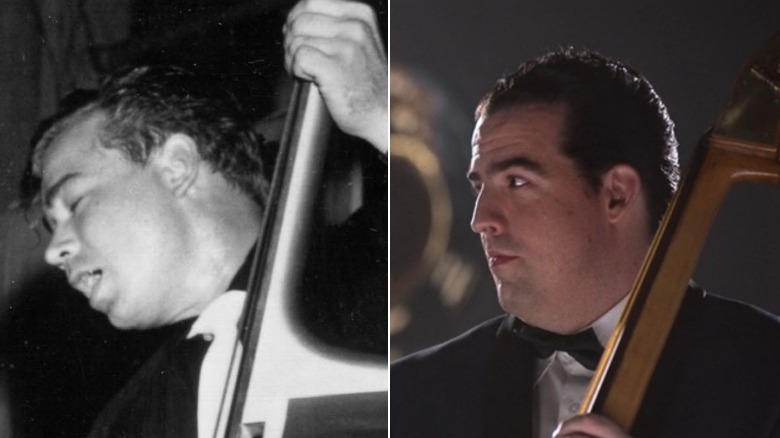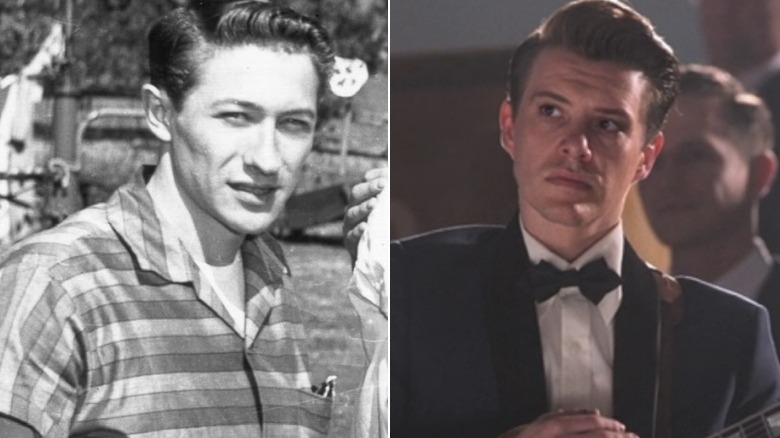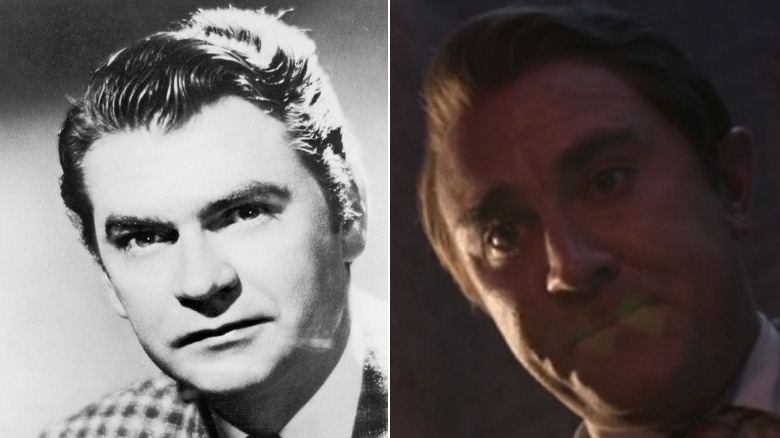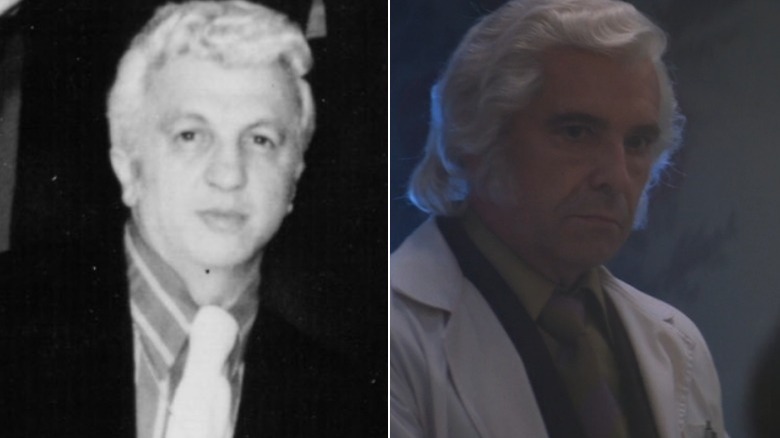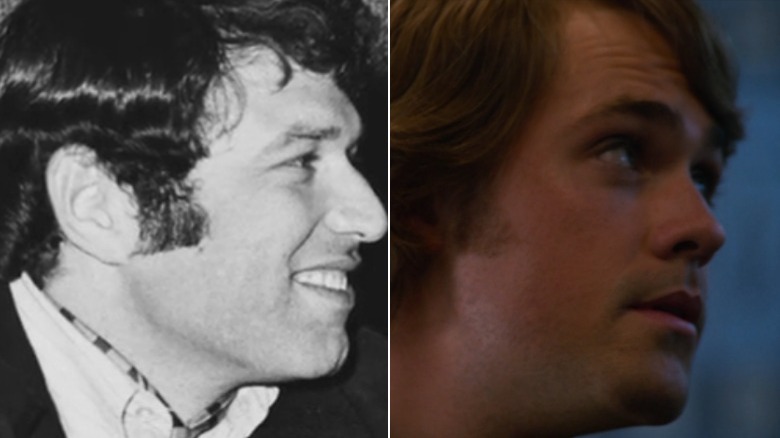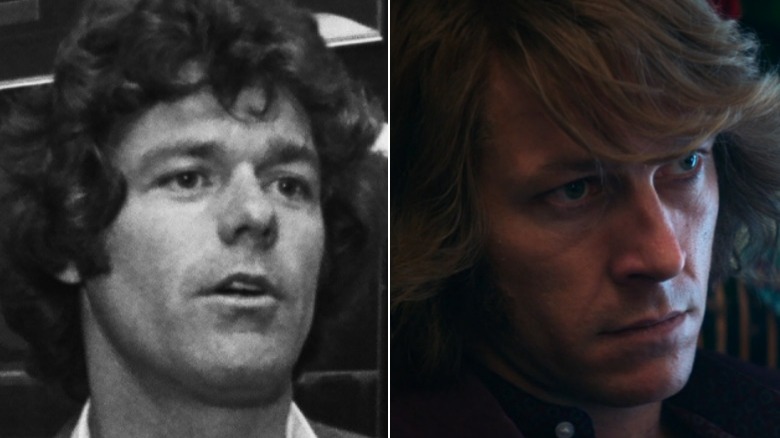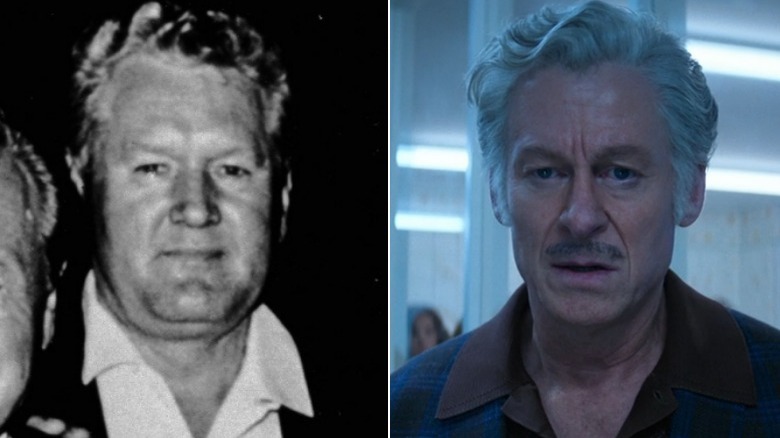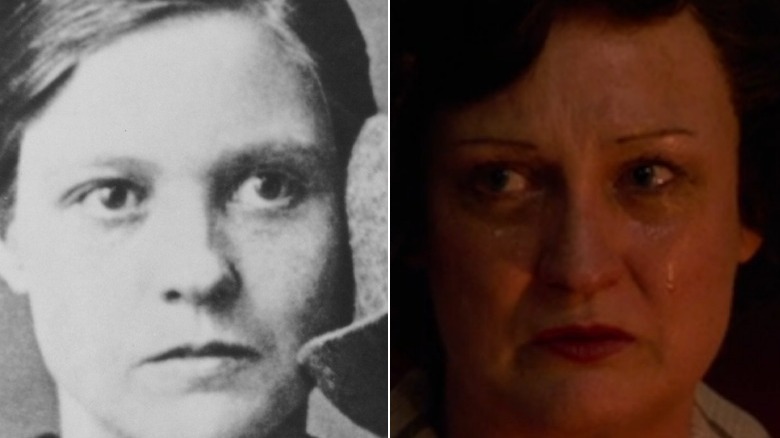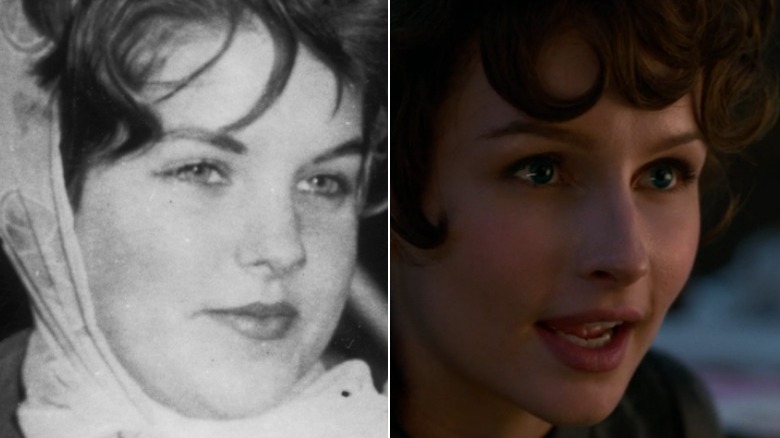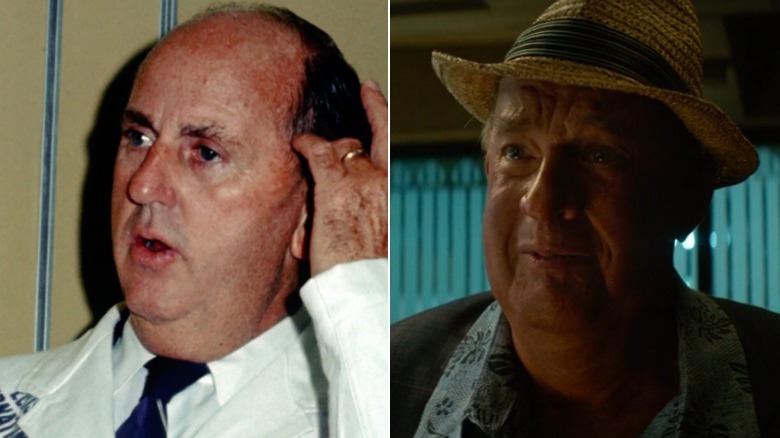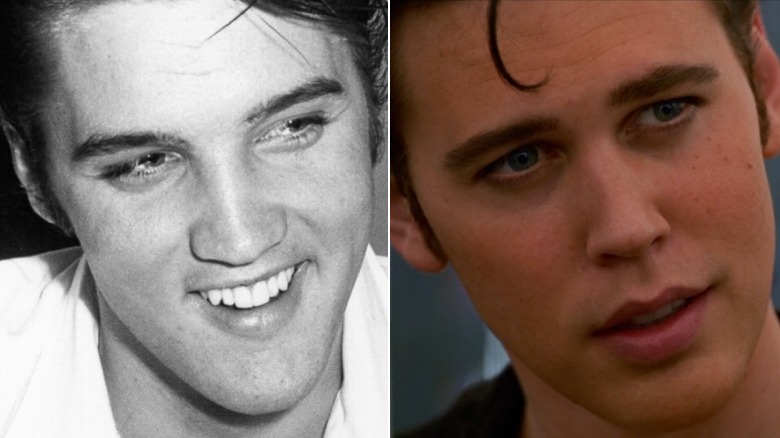How The Cast Of Elvis Should Really Look
Many actors over the years have played Elvis Presley. Some of them, like Kurt Russell in John Carpenter's 1979 miniseries, bear an uncanny resemblance in appearance and voice, while others, like Michael Shannon in 2016's "Elvis and Nixon," do not. It is one of the many pitfalls fact-based films face: How accurately to portray real-life figures, or even what it means to be "accurate." The late Philip Baker Hall, for example, neither looked nor sounded much like Richard Nixon in Robert Altman's "Secret Honor," but captured the former president's essence in performance; meanwhile, disgraced thespian Kevin Spacey gave himself a fake hairline and jowls for his full-body impersonation as the other half of "Elvis and Nixon." Which performance could be said to be more "accurate?"
Baz Luhrmann's 2022 biopic "Elvis" is a delightfully overblown race through The King's life, from his impoverished Mississippi childhood to his lonely death at age 42, centered around Austin Butler's Oscar-nominated performance. The film is filled with characters based on real people: Presley's contemporaries and influences, his entourage and hangers-on (the so-called "Memphis Mafia"), and his wife and family. Some of the actors were cast based on their striking physical resemblance, while others, like Tom Hanks' Colonel Tom Parker, have hair, faces, and voices that are not their own. Here is a look at the cast of "Elvis," compared to their real-life counterparts.
Hank Snow (played by David Wenham)
Canadian Country singer Hank Snow has a brief but significant role in the Elvis mythology. Snow was a well-established star in Nashville by the early 1950s, known best for his travelogue novelty hit "I've Been Everywhere" and his dazzling array of Nudie suits. He performed regularly at the Grand Ole Opry and convinced management to let Presley, then a mostly unknown singer out of Memphis, open for him. Presley also toured with Snow and was briefly represented by Snow's management company; it was at one of these Snow-headlining tours that Colonel Tom Parker first saw Presley perform. By 1955, Parker and Snow were both representing Presley, but it wouldn't be long before Parker muscled out Snow and ruled the remainder of Presley's career with an iron fist.
Australian actor David Wenham has been a Luhrmann repertory player since "Moulin Rouge!" in 2001, starring as the main villain of Luhrmann's 2008 historical romance "Australia" opposite Nicole Kidman and Hugh Jackman. Wenham's blond locks have been switched out here for a slightly-receding dark brown 'do, but otherwise his transformation is all in the performance, covering up his Aussie brough with a lilt of Snow's native Nova Scotia.
B.B. King (Kelvin Harrison, Jr.,)
It's no secret that white musicians who played Blues music and R&B under the guise of rock and roll, like Presley, Jerry Lee Lewis, and others, had avenues to fame and fortune that were not open to their Black contemporaries. Luhrmann's film can't change that history, but it does give space to the artists of color who left their mark on Presley, particularly Riley "B.B." King, who was already a Blues guitar hero and DJ on Memphis station WDIA when Presley was just starting out at Sun Records. The film depicts a friendship between Presley and King in those early Memphis days that didn't exist; in real life, King would regard Elvis' phenomenal rise to power mostly from a distance "with a mixture of fascination and envy," according to biographer Daniel de Vise (via LitHub).
In the film, King is played by Kelvin Harrison, Jr., a young actor best known for his powerful work in independent films like Dee Rees' "Mudbound" and Trey Edward Shults' "Waves." The part is brief, just a handful of scenes; King is there mostly to act as Elvis' entryway into the Black music scene in Memphis. The makeup and costuming do much of the heavy lifting for Harrison's physical transformation, recreating King's close-cropped hair and wispy mustache. In an interview with Collider in February 2022, Harrison spoke of his preparation for the role, which included listening to a lot of King's music to get his buttery vocal cadence down, but also understanding the heightened reality of Luhrmann's films. "It's the spirit of B.B. King and the most fun version of himself."
Little Richard (Alton Mason)
Another artist who had a tremendous impact on Presley's look and presentation was Little Richard. His hard-charging, gospel-influenced R&B and flamboyant style on and off-stage made him one of the first rock and roll artists, if not the first (though Fats Domino and Ike Turner might have disagreed). In the film, Little Richard (born Richard Penniman in Macon, Georgia) is not as much of a character (like B.B. King) as he is a vision of the future for young Presley, drawing a direct line from Richard's duckwalks and stage antics to the Elvis-brand hip-swivels and leg shakes that would scandalize white audiences.
To play Little Richard, Luhrmann cast model Alton Mason, who matches not just Richard's lanky physicality but the soft, almost feminine looks that defined the singer (and Presley) at this time in their careers. In an interview with Jakes' Takes, Mason said that that he relished playing such a young version of the musical icon, coming out of the church (if not out of the closet) and able to "be sexy and be wild." Richard's style appears to have left as much of a mark on Mason as it did on Presley, as his wardrobe at the film's Cannes premiere and at the 2022 Met Gala have borne a distinct Little Richard flair.
Big Mama Thornton (Shonka Dukureh)
The film's inclusion of singer Big Mama Thornton and her rendition of "Hound Dog" points to one of the thorniest aspects of Presley's legacy — and of rock and roll in general: Its appropriation — if not theft — of Black music styles.
Willie Mae Thornton was born in Alabama and, like many blues and R&B singers before and after, grew up singing in the church. Her professional career began in Houston blues clubs and in New York, where she collaborated with white proto-rocker Johnny Otis and songwriters Jerry Lieber and Mike Stoller. Lieber and Stoller's song "Hound Dog," about a woman giving a lazy, good-for-nothing man a piece of her mind, was a number one hit on the R&B charts for Thornton in 1953, but would be overshadowed three years later when Presley recorded his own version with altered lyrics ("You ain't never caught a rabbit/and you ain't no friend of mine").
Nashville-based singer Shonka Dukureh plays Thornton briefly in the film. She bears little physical resemblance to the real-life pioneer, but expertly recreates Thornton's ferocious blues growl. A sample of her performance formed the basis of the Doja Cat tie-in single "Vegas." She also appeared in the song's video and performed it live with Doja at Coachella in 2022. Sadly, Dukureh passed away at age 44, just a few weeks after the film's release.
Bill Black (Adam Dunn)
Bass player Bill Black was a session player at Sun Records when he, guitarist Scotty Moore, and drummer DJ Fontana played on Presley's early tracks. After their high-energy version of "That's All Right, Mama" became an unexpected hit, Black suggested that they cover the Bill Monroe Bluegrass waltz "Blue Moon of Kentucky" in similar fashion. The record was another hit and cemented Black, Moore, and Fontana as "The Blue Moon Boys," Presley's official backing band in those early years. Black stayed with Presley until 1959, when Elvis famously served in the Army for two years, and formed his own group, the Bill Black Combo. Black died in 1965 and was inducted into the Rock and Roll Hall of Fame in 2009.
Australian comic actor Adam Dunn plays Black in "Elvis." Dunn matches Black's slick dark hair and stocky frame, which for the most part is all Dunn is used for; he and Xavier Samuels as Scotty Moore are largely background players in the film's early performance scenes. Dunn's biggest moment as Black is an invented (and possibly libelous) scene where he introduces an exhausted Elvis to amphetamines, kickstarting a pill addiction that would last for the rest of Presley's life.
Scotty Moore (Xavier Samuels)
More than anyone — other than perhaps Muddy Waters and Elmore James — Scotty Moore defined the sound of rock and roll guitar in the genre's first decade. Hard-driving and Country-inflected, his works were a major influence on the next wave of rock gods — George Harrison and Keith Richards especially — who were coming up, just a few years younger than he. Moore and Presley would go their separate ways, but when it came time for The King's 1968 television concert — the "Comeback Special" — he called on Moore to join him once again. Unlike Bill Black, Moore lived long enough to see his contributions to popular music recognized and celebrated, and he enjoyed his status as an elder statesman until his death in 2016.
Xavier Samuels brings Moore to life in Luhrmann's film. The young Australian actor made a name for himself in the Brad Pitt World War II drama "Fury" and the 2016 Jane Austen adaptation "Love and Friendship," but he's perhaps best known in the United States for a small role in the third "Twilight" movie. In 2022 he portrayed Hollywood scion Cass Chaplin in the year's other controversial biopic of a mid-century legend, "Blonde." Like his on-screen bandmate Adam Dunn, Samuels seems to have been cast for the way that his features — fair complexion and a sharp nose — evoke Moore from a distance; both exit the film unceremoniously and are not heard from again.
Sam Phillips (Josh McConville)
One of the architects of American music in the back half of the 20th century, Sam Phillips founded Sun Records and opened its storefront recording studio in Memphis in 1952. He had tasted success with Black artists on the Blues and R&B charts, including B.B. King, Howlin' Wolf, and Rufus Thomas, but felt that there were greater heights he could reach if he could package Black music with a handsome white singer who could power through the defenses of a deeply segregated culture. Enter an 18-year-old Mississippi truck driver named Elvis Presley. Along with Presley and other white artists like Carl Perkins, Jerry Lee Lewis, and Johnny Cash (the famed "Million Dollar Quartet"), Phillips developed the "Sun Records Sound," which became the de facto sound of the golden age of rock and roll. In addition to Sun, Phillips also owned radio stations around the South and was an early investor in the Holiday Inn motel chain.
Actor Josh McConville is mostly known as a theater actor in his native Australia; his most notable work to American audiences is likely the 2020 Blumhouse horror remake of the 1970s series "Fantasy Island." With a red wig fixed atop his bald pate and a series of smart 1950s blazers, McConville makes for a recognizable Phillips, who was very much the image of a clean-cut businessman in those days; like many, his style turned wilder and woolier in the '70s, though he has long left the film before it reaches that era.
George Dr. Nick Nichopoulos (Tony Nixon)
Greek-American physician Dr. George Nichopoulos would achieve first fame, then infamy, in his role as Presley's personal physician. The Memphis-based doctor, popularly known as "Dr. Nick," was an unofficial member of Presley's entourage, known as the "Memphis Mafia." He attended to Presley both at home in Graceland and on the road, but came under scrutiny in the years after the King's death at age 42, when the extent of Presley's pill addiction became known for the first time. While some accused Dr. Nick of malpractice and overprescription, he always denied any wrongdoing on his part, even when faced with some fairly damning questions by Geraldo Rivera on a 1979 episode of "20/20." In the decades to come, he would be honored ignominiously by sharing his nickname with the worst doctor in Springfield.
English-born but Australia-based actor Tony Nixon plays Dr. Nick in what is ultimately a small role, often in group scenes with the rest of the Memphis Mafia. What makes him stand out in those scenes is the same thing that made Dr. Nick so distinctive in real life — his Gorgeous George-like shock of curly blond hair — which he maintained (even as it went white) until his death in 2016.
Steve Binder (Dacre Montgomery)
If the 1968 "Comeback Special" (officially titled "Singer Presents...Elvis") was the rebirth of The King after a decade in the Hollywood weeds, then Steve Binder was its midwife. A wunderkind television producer and director, Binder had helmed the landmark rock concert special "The T.A.M.I. Show" in 1964, as well as a Petula Clark special earlier in '68 that brewed a small controversy when the show's sponsor Chrysler objected to a stray touch between her and duet partner Harry Belafonte. Despite a career that stretched nearly to the 21st century, the Comeback Special is by far the most famous project Binder worked on, with the possible exception of the infamous "Star Wars Holiday Special."
"Stranger Things" villain Dacre Montgomery plays Binder as a New Hollywood rebel, unimpressed with Elvis' faded star power but inspired by his power as a musician — and perhaps more importantly, willing to defy Colonel Tom's desire for the show to be a hacky Christmas special. Montgomery's wig is not the best, though Binder's own haircut at the time was no great shakes either. Costume designer Catherine Martin did, however, preserve Binder and Presley's shared love of neckerchiefs.
Jerry Schilling (Luke Bracey)
Jerry Schilling was 12 years old when one day he found himself playing a pick-up football game in a Memphis park with his older brother's friend Red West and another pal of West's, a recent Humes High School graduate whose records were getting played all over town. This was the beginning of a lifelong friendship between Schilling and Presley, and 10 years later, just as Schilling was finishing college, the King offered him a job. Schilling performed many duties for Presley over the years, even working as his stunt double in the 1969 western "Charro!" In between working with Elvis, Schilling also worked as a manager to Jerry Lee Lewis and the Beach Boys. Several years after Presley's death, Schilling went to work for Elvis Presley Enterprises, and has served as producer on a number of films and documentaries.
Yet another Aussie in the cast, Luke Bracey plays Schilling. Known for his appearances in Mel Gibson's "Hacksaw Ridge" and the 2018 "Crocodile Dundee" Super Bowl ad for the Australian Tourism Board, Bracey shares Schilling's broad chin and fine head of hair (though credit there is likely due to the costuming department), and connected to the character as perhaps the one person in the last decade of Elvis' life who could tell him no.
Vernon Presley (Richard Roxburgh)
Presley's father Vernon never stopped working. Before his son became a superstar, Vernon worked as a laborer in Mississippi and later in Memphis; afterwards, he took an active hand in managing his son's business and accompanied him on the road for his entire career. After Elvis died, Vernon became the public face of the family's grief, even filming a special thank-you message to the thousands who sent letters of condolence to Graceland that was aired on CBS in 1977. Vernon died in 1979, just two years after his son.
Vernon is often portrayed as his son's moral compass, the true north that Elvis often turns away from. To embody this paragon of working class virtue, Luhrmann had originally cast Rufus Sewell, but when COVID-19 delays forced the "Dark City" star to bow out, the filmmaker brought in a ringer: Celebrated Australian actor Richard Roxburgh. Luhrmann fans, of course, already know Roxburgh from his villainous turn in "Moulin Rouge!" but in recent years he also made acclaimed turns on "The Crown" and "Catherine the Great." Roxburgh doesn't look much like Vernon (nor does Rufus Sewell, for that matter), but there's a sensitivity in his eyes that conveys the way Presley was utterly overwhelmed by the path his son's life took, too often ceding his fatherly duties to Colonel Tom.
Gladys Presley (Helen Thomson)
With all due respect to Priscilla and the many other women whom Elvis was involved with over the years, only one ever lived in his heart, and that was his mother Gladys. Mrs. Presley doted on her only son (after the death in childbirth of Elvis' twin brother Jesse), and was doted upon in return. As Elvis began to taste real success, he was determined that his parents would reap the rewards. When Presley's character died at the end of his first film, "Love Me Tender," the story goes that it upset Gladys so much that he refused to ever be killed off in a movie again. Gladys herself passed away in 1958, while Presley was stationed in Texas with the Army. Presley was so distraught at the funeral that he threw himself on her coffin while clutching one of her housecoats, taking ill for several days afterward.
Maggie Gyllenhaal was originally cast as Gladys in "Elvis," but like her would-be screen husband Sewell, departed the project when COVID-19 caused significant delays. Luhrmann recast the role with veteran Australian actress Helen Thomson, who has starred in many projects with her "Elvis" castmates over the years, including a stint in the 2010s with movie husband Richard Roxburgh on his barrister dramedy "Rake." Thomson's glamorous blonde locks were tamped down for the more dowdy and working class dark brown 'do of Gladys, but there's a potent — and eyebrow-raising — chemistry between she and Butler that speaks to longstanding rumors that Elvis and Gladys were closer than what might be appropriate.
Priscilla Presley (Olivia DeJonge)
Priscilla Beaulieu's stepfather was an Air Force officer, and the family moved around a lot. In 1959 they had relocated to Wiesbaden, West Germany, where she met a young GI named Elvis Presley at a party. Beaulieu was 14-years-old at the time. Like his former Sun Records stablemate Jerry Lee Lewis, Presley and Beaulieu had a potentially scandalous and illegal relationship on their hands.
At age 16, Beaulieu moved into Graceland and finished high school in Memphis, and five years later in 1967 she and Presley were married. The marriage lasted just a few years, torn apart by mutual infidelities (though his far outnumbered hers). After the death of Presley and his father Vernon, however, Priscilla took control of the King's estate and founded Elvis Presley Enterprises, which has ensured that Elvis remains one of the highest-earning celebrities, alive or dead, in the world.
To prepare to play Priscilla, Australian actress Olivia DeJonge would listen to her voice narrating a tour of Graceland every night as she fell asleep (although she also could have watched the "Naked Gun" movies to get a sense of her excellent comedic timing). Best known for her roles in the Netflix dystopian teen drama series "The Society" and M. Night Shyamalan's found footage horror flick "The Visit," DeJonge nailed the cherubic look of young Priscilla, in the first blush of romance. She saw her role in the film as bringing out the more tender, playful side of the Elvis story, even if Priscilla's real life story was frequently anything but.
Colonel Tom Parker (Tom Hanks)
Of all the father figures in Presley's life, from Hank Snow to Sam Phillips to his actual father Vernon, none of them had the level of control over his life and career, for better and often for worse, than manager "Colonel" Tom Parker. Much of Parker's life has been shrouded in mystery; for one thing, he was not a colonel, nor was his name Tom Parker.
Born Andreas van Kuijk in the Netherlands, Parker came to the United States, possibly illegally, at age 20 and got work as a carnival promoter. One kind of circus led to another, and by the 1940s he was managing and promoting musical acts. Working with Presley, Parker engineered the course of the young man's life, from serving in the Army rather than requesting deferment, his years cranking out one bad (but profitable) movie after another, to his never-ending engagement at the Hilton International Hotel in Las Vegas.
Parker has been portrayed on film many times, and with varying degrees of sympathy. Beau Bridges played him as a full villain in the 1993 television movie "Elvis and the Colonel: The Untold Story," while Randy Quaid's version of him in the CBS miniseries "Elvis" was more understanding. Oscar-winner Tom Hanks' take, underneath layers of prosthetic weight to better resemble the real-life Parker — though sporting a thick Dutch accent that Parker did not have — is divisive, to say the least; while his scene partner Butler was nominated for an Oscar, Hanks' sole awards notice has been a Razzie nomination.
Elvis Presley (Austin Butler)
There are a dozen different ways to look at the rise and fall of The King: As the ultimate symbol of American up-by-your-bootstraps success; as a lost young man who was failed by everyone around him; as the ultimate figure of white mediocrity profiting from Black excellence; as a triumph of branding above all else. It would be hard to find anyone born in the 20th century who doesn't know what Elvis looked like: The jet-black hair, dyed from his natural dirty blonde; the baby-faced pout and soulful blue eyes; and later, the thick sideburns and white jumpsuits.
Star Austin Butler referred to Presley's place in American culture as "the wallpaper of society" in a May 2022 interview with the Hollywood Reporter; his process as an actor was to pull Presley from that pedestal and see him as a human being rather than an icon. It was a grueling process for the young former Nickelodeon star, one that involved working with multiple voice coaches as he charted the evolution of Presley's singing style — a process that briefly hospitalized him and has apparently left him unable to switch the voice off. Butler read and listened to everything he could find about Elvis, to the point that Tom Hanks had to gently urge him to stop for his own sanity. The result is a transformative performance that has earned tremendous acclaim.
